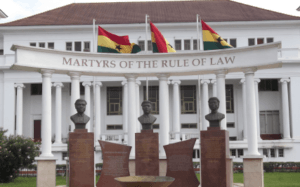Special Voting verdict on Monday
 The Supreme Court has fixed Monday November 14 to deliver judgement in the case in which the Electoral Commission (EC) was being compelled to announce results of Special Voting on the same day it was held.
The Supreme Court has fixed Monday November 14 to deliver judgement in the case in which the Electoral Commission (EC) was being compelled to announce results of Special Voting on the same day it was held.
The date was announced after parties in the matter namely the Electoral Commission, the Attorney and Dr Kwame Amoaku-Tuffuor and two others had filed their memorandum of issues agreed on.
Meanwhile the seven member panel has registered their displeasure over the absence of any of the six commissioners in court.
The court noted that their non-appearance connoted a “share gross disrespect” to the apex court, adding that if any of them were present, they would have assisted the court with answers relating to the matter.
The Court presided over by Justice William Atuguba wanted to know whether there were countries that had practiced earlier, special or advance voting and whether or not the counting had been done the same day votes were cast or suspended until polls were closed.
Other members on the panel were Justice Anin Yeboah, Justice Jones Victor Dotse, Justice Ampah Benin, Justice Yaw Appau and Justice Gabriel Pwamang.
The court also wanted to know how and where these ballots were kept adding the Attorney General did not conduct elections and would therefore not know all issues relating to elections.
According to the court in the case of Abu Ramadan verses the EC, some of the commissioners were in court and when they needed clarification, Mr Thaddeus Sory who represented the EC consulted the Commissioners and matters were resolved.
The SC also sought for clarity as to whether the venues for the Special Voting were part of the 29,000 voting centres and whether ballots cast at these centres were added to those in the various constituencies that voting took place.
The court indicated that countries like Sweden, Australia and USA embarked on advanced voting but wanted the commissioners to throw more light on how counting were done.
It recounted some discrepancies in the media concerning some of its recent judgements and rulings adding if any of the commissioners were around they would have been informed about those issues.
Mr Egbert Faibille, told the court that his clients relied on the processes filed before the court recalling that the Special Voting would be held on December 1, 2016.
According to him although during the special voting there were the presence of polling agents, counting could not be done.
Mr Faibille in response to the Supreme Court question, indicated that his clients were not challenging the constitutionality of Special Voting.
He said he was aware that South Africa embarked on Special Voting but after a search on a website, there were no clues as to how counting was done.
Mr Sean Opoku, who represented the EC was unable to answer some of questions put up by the Supreme Court and apologised for nonappearance of any of the commissioners.
Mrs Dorothy Afriyie, Chief State Attorney who represented the AG relied on their processes filed adding she was aware that in some countries, special voting were sealed and posted and received through post offices.
Dr. Kwame Amoako-Tuffuor, a member of the New Patriotic Party (NPP) and two others proceeded to the highest Court of the land to seek an order to compel the Commission to announce results of special voting on the same day it was held.
Dr Amoako-Tuffuor and the other plaintiffs, Benjamin Arthur and Adreba Abrefa Damoa contended that security operatives and persons who would usually be working on the Election Day partake in the special voting.
The Plaintiffs are of the belief that people who wanted to take part in the special voting should not be made to wait until the total results on actual polling were to be declared and that the results should be declared immediately after the polls have closed.
They argued that section 23 of C.I. 94; the law which regulated the conduct of the Polls was inconsistent with Article 49 of the 1992 constitution.
According to them per the C.I. 94, the Returning Officer shall at the end of the special voting: ensure that the ballot boxes used in the special election are kept in safe custody after the poll has closed. Also, the Officer is to ensure that the ballot boxes are sealed with the seals of the EC and any candidates or party who wish to add their seal.
The EC also arranges for the ballot boxes to be opened at the time of the counting of the votes cast on the polling day and the ballot papers shall be counted in the same manner as those contained in the ballot boxes used on the main polling day.
The plaintiffs are seeking a true and proper interpretation of Article 49 of the Constitution of the Republic of Ghana, 1992, as against special voting’ in CI.94.
Source: GNA
